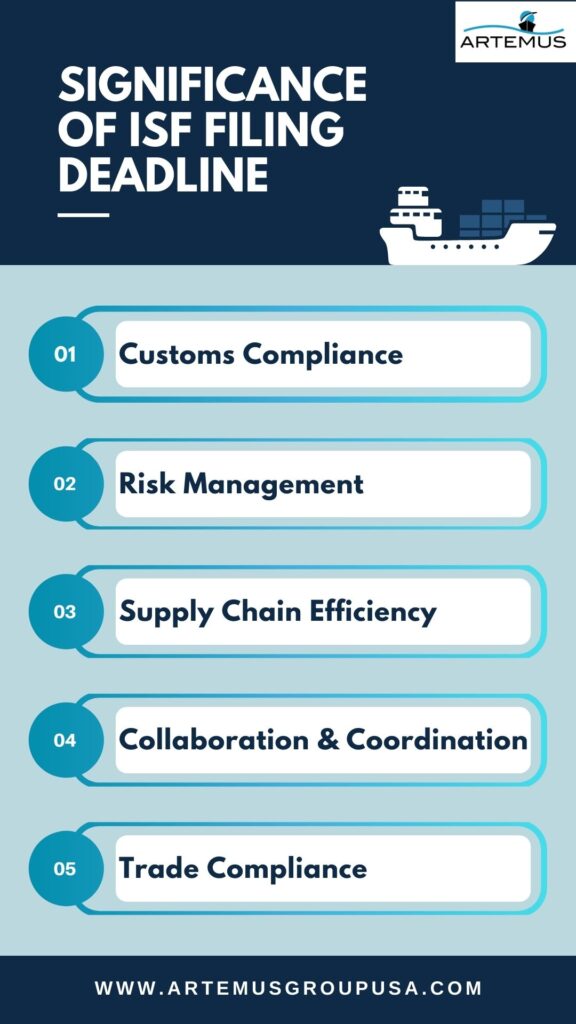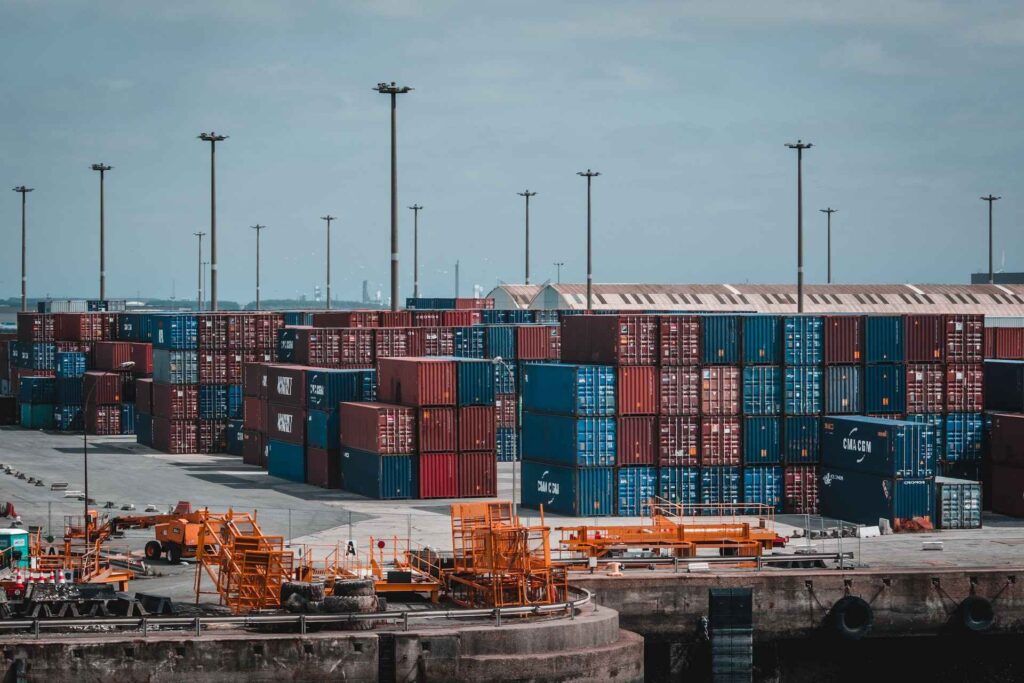
What Is Inbound Logistics & Outbound Logistics? A 2025 Guide
In the dynamic world of supply chain management, understanding the nuances of inbound and outbound logistics is crucial for operational

Understanding the ISF (Importer Security Filing) deadline is vital for any business importing goods into the USA. Missing this critical deadline can lead to severe consequences, including hefty fines and shipment delays. In this blog, we’ll explore the ISF filing timeline, the penalties for non-compliance, and any exceptions you need to know.
With the complexity of these regulations, it’s essential to have the right tools at your disposal. Artemus offers advanced ISF and AMS filing software solutions that ensure seamless compliance, helping you avoid costly errors and keep your supply chain running smoothly.
Table Of Contents
Meeting the Importer Security Filing (ISF) filing deadline is crucial for smooth customs clearance and efficient supply chain operations. The ISF filing timeline refers to the period within which importers must submit the necessary information to the U.S. Customs and Border Protection (CBP) prior to the arrival of the cargo. Understanding the timeline and ensuring timely submission is vital to avoid penalties, delays, and potential disruptions in the supply chain.
The general ISF filing deadline requires importers to submit the required information at least 24 hours before the cargo is loaded onto a vessel destined for the United States. However, it’s important to note that the exact deadline may vary based on the mode of transportation and the unique circumstances of the shipment.
For ocean shipments, the 24-hour deadline applies, meaning the ISF must be filed prior to the vessel’s departure from the foreign port. It is essential for importers to work closely with their shipping agents or freight forwarders to ensure that the ISF is submitted within this timeframe. Late or non-compliant filings can result in penalties and additional scrutiny by customs authorities.
To ensure compliance with the ISF filing deadline, importers should establish efficient processes and procedures within their organization. This includes gathering the required information well in advance, verifying its accuracy, and promptly submitting the ISF to the CBP. Collaboration with shipping partners, such as carriers and freight forwarders, is crucial to align efforts and meet the filing deadline collectively.
Related: 5 Types Of ISF Penalty & Fines To Know To Avoid Losses
The Importer Security Filing (ISF) filing deadline holds great significance in international trade and the efficient movement of goods across borders. Meeting the deadline is essential for several reasons:

1. Customs Compliance: The ISF filing deadline ensures compliance with customs regulations. By submitting the required information within the specified timeframe, importers demonstrate their commitment to adhering to the rules and regulations set by customs authorities.
Compliance promotes smooth customs clearance processes and minimizes the risk of penalties, fines, or additional scrutiny.
2. Risk Management: Timely submission of the ISF allows customs authorities to assess and mitigate potential security risks associated with imported goods. The advanced information provided through the ISF enables authorities to identify high-risk shipments, verify the accuracy of the cargo data, and take appropriate measures to ensure the safety and security of the supply chain.
By meeting the deadline, importers contribute to enhanced risk management practices and contribute to overall supply chain security.
3. Supply Chain Efficiency: The ISF filing deadline plays a crucial role in maintaining the efficiency of the supply chain. Timely submission of the ISF enables customs authorities to process the information, perform risk assessments, and make informed decisions regarding the release of cargo.
By meeting the deadline, importers help prevent delays in customs clearance, avoid additional inspections, and ensure the seamless flow of goods through the supply chain.
4. Collaboration & Coordination: The ISF filing deadline encourages collaboration and coordination among various stakeholders involved in international trade. Importers need to work closely with their shipping agents, freight forwarders, and customs brokers to gather the necessary information and submit the ISF within the specified timeframe.
Effective communication and collaboration among these parties contribute to the timely and accurate submission of the ISF and facilitate efficient supply chain operations.
5. Trade Compliance: Meeting the ISF filing deadline reflects an importer’s commitment to trade compliance. It demonstrates the importer’s dedication to fulfilling their obligations and promoting fair and lawful trade practices.
Compliance with the filing deadline helps maintain the integrity of the global trade system and supports a level playing field for all participants.
Related: ISF Filing Requirements: A Step-By-Step Guide

While the general rule for Importer Security Filing (ISF) requires importers to submit the required information at least 24 hours before the cargo is loaded onto a vessel bound for the United States, there are certain exceptions and special scenarios that importers should be aware of.
These circumstances may alter the ISF filing deadline and require careful attention to ensure compliance with customs regulations.
In-bond shipments refer to goods that are transported through the United States to a final destination outside the country. For these shipments, the ISF filing deadline is typically modified to align with the movement of the cargo.
Importers should coordinate closely with their shipping agents and customs brokers to determine the appropriate deadline for filing the ISF based on the specific routing and transit requirements.
IE and T&E shipments involve goods that are temporarily brought into the United States for immediate export or transportation to another location within the country.
In these cases, the ISF filing deadline may be adjusted to accommodate the unique nature of these shipments. Importers should work closely with their customs brokers and shipping partners to determine the appropriate deadline based on the specific circumstances of the IE or T&E shipment.
Certain shipments of government or military cargo may be subject to specific exemptions or adjusted filing deadlines. The CBP may provide alternative timelines for ISF submission for these types of shipments.
Importers should consult with the relevant government agencies and their customs brokers to determine the specific requirements and deadlines applicable to the government or military cargo.
Occasionally, unforeseen circumstances such as adverse weather conditions, mechanical issues, or labor disputes can lead to delays or changes in the shipping schedule. In such situations, importers should communicate promptly with their shipping agents or freight forwarders to assess the impact on the ISF filing deadline.
It may be necessary to adjust the deadline to align with the revised shipping schedule and ensure compliance with ISF requirements.
Related: ISF Filing Cost: Elements, Hidden Costs, & Minimization Tips
Meeting the Importer Security Filing (ISF) filing deadline is crucial for ensuring smooth customs clearance and avoiding penalties. Here are some tips to help importers meet the ISF filing deadline effectively:
Related: Late ISF Filing: What To Do If Missed The Deadline?

Missing the Importer Security Filing (ISF) filing deadline can have significant consequences for importers. Here are some potential repercussions of failing to meet the deadline:
One of the most immediate consequences of missing the ISF filing deadline is the imposition of penalties and fines by customs authorities. The exact amount of the penalties can vary depending on the circumstances, but they can be substantial.
These financial consequences can significantly impact an importer’s bottom line and erode profitability.
Late or non-compliant ISF filings can attract heightened scrutiny from customs authorities. This means that the cargo may be subject to additional inspections, examinations, or even delays.
Increased customs scrutiny not only causes delays in the release of goods but also disrupts supply chain operations and leads to additional costs.
Missing the ISF filing closing limit can result in disruptions throughout the supply chain. Delayed customs clearance and increased inspections can cause delays in the delivery of goods to customers.
This can lead to dissatisfied customers, strained relationships with suppliers, and potential loss of business opportunities. The domino effect of supply chain disruptions can be challenging to rectify and may result in long-term consequences for an importer’s reputation and competitiveness.
Related: ISF Form (Import Security Filling): Elements & Top Practices
Meeting your ISF filing deadline is crucial for avoiding costly penalties and ensuring smooth imports into the USA. Artemus’ ISF software streamlines this process by offering a user-friendly platform that automates and simplifies filing.
The software ensures compliance by accurately collecting, validating, and submitting the required data, reducing the risk of errors and delays. With real-time updates and reliable customer support, Artemus’ ISF software helps you meet deadlines with ease, keeping your shipments on track and your business running efficiently.
Related: ISF Filing Requirements: Important Facts & Documents
An Importer Security Filing (ISF) should be filed at least 24 hours before the cargo is loaded onto a vessel bound for the United States to ensure compliance with U.S. Customs regulations.
If an Importer Security Filing (ISF) is filed late, the importer may face fines, shipment delays, or customs holds, as well as increased scrutiny on future imports.
The cut-off time for ISF (Importer Security Filing) is 24 hours before the cargo is loaded onto a vessel bound for the United States. This ensures compliance with U.S. Customs and Border Protection (CBP) regulations.
The ISF 24-Hour Rule requires importers to submit the required information for their shipments at least 24 hours before the cargo is loaded onto a vessel destined for the United States.

The ISF filing deadline plays a pivotal role in the importation process, requiring importers to submit essential information about their cargo before it arrives in the United States. Meeting the ISF filing closing limit is crucial for customs compliance, risk management, and maintaining supply chain efficiency. Importers must plan ahead, collaborate with partners, and stay updated with regulations to ensure timely ISF submission.
Failing to meet the deadline can result in penalties, increased customs scrutiny, and disruptions in the supply chain. By understanding the significance of the ISF filing deadline and following best practices, importers can navigate the complexities of international trade with confidence and facilitate a smooth customs clearance process.
Related: What Is AMS In Shipping Industry? A Beginner’s Guide

In the dynamic world of supply chain management, understanding the nuances of inbound and outbound logistics is crucial for operational

In today’s interconnected world, businesses rely heavily on global trade to expand their markets, access new resources, and drive growth.

Importing goods for resale in the USA presents a lucrative business opportunity, but navigating the complexities of U.S. customs regulations,
Get In Touch
Artemus’ Software Solutions for ISF, AMS, Japan AFR, eManifest Canada, & Panama B2B filings.
Get In Touch
Artemus’ Software Solutions for ISF, AMS, Japan AFR, eManifest Canada, & Panama B2B filings.